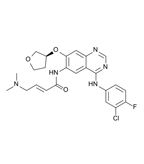HER2-Targeted Therapies Could Benefit Lung Cancer Patients With HER2 Mutations
A new study shows that drugs targeting HER2 might provide good results in the rare non-small-cell lung cancer (NSCLC) patients with HER2 mutations.
Though commonly associated with breast cancer, HER2 mutations occur in a small proportion of non–small-cell lung cancer (NSCLC) patients. A new study looked at the prominence of the mutation, and showed that drugs targeting HER2 might provide good results in these patients.

Chemical structure of afatinib, one of the HER2-targeted drugs used in the study
“Among reported lung cancer biomarkers, HER2 as a target remains poorly described,” wrote researchers led by Julien Mazires, MD, of Larrey Hospital in Toulouse, France, online ahead of print on April 22 in the Journal of Clinical Oncology. “HER2 overexpression or gene amplification is widely known to be associated with sensitivity to HER2-targeting drugs (trastuzumab, lapatinib, pertuzumab, and T-DM1) in breast cancer.”
Dr. Mazires and colleagues retrospectively studied a group of patients in France, Spain, and Switzerland with NSCLC who carried a HER2 mutation in exon 20. The mutation was found in 65 patients out of 3,800 tested, yielding an incidence of 1.7%. Previous research has shown similar rates, ranging from 1% to 6%.
There were more women than men in the group (45 vs 20), and more never-smokers (34 individuals) than current (12) or former smokers (11). All patients had adenocarcinomas, and 33 had stage IV disease. The median overall survival was 40 months for all stages of disease.
The investigators also looked into the effect of HER2-targeted therapies in these patients. A total of 16 patients with stage IV or recurrent NSCLC received both conventional chemotherapy as well as one or more of the available HER2 therapies (some received more than one, yielding 22 total therapies to evaluate). Four patients had progressive disease, seven had disease stabilization, and 11 achieved a partial response.
“Specifically, we observed a disease control rate of 96% for trastuzumab (Herceptin)-based therapies (n = 15) and 100% for afatinib (n = 4),” the authors wrote, adding that no responses were seen in limited data on lapatinib or masatinib. The median progression-free survival (PFS) from the start of the first HER2-specific treatment was 5.1 months.
“Our study indicates that anti-HER2 therapies are associated with encouraging response rates, disease control rates, and PFS in patients with heavily pretreated HER2-mutated NSCLC,” the investigators wrote. They concluded that the drugs, particularly trastuzumab and afatinib, merit study in larger clinical trials of patients with these relatively rare mutations.